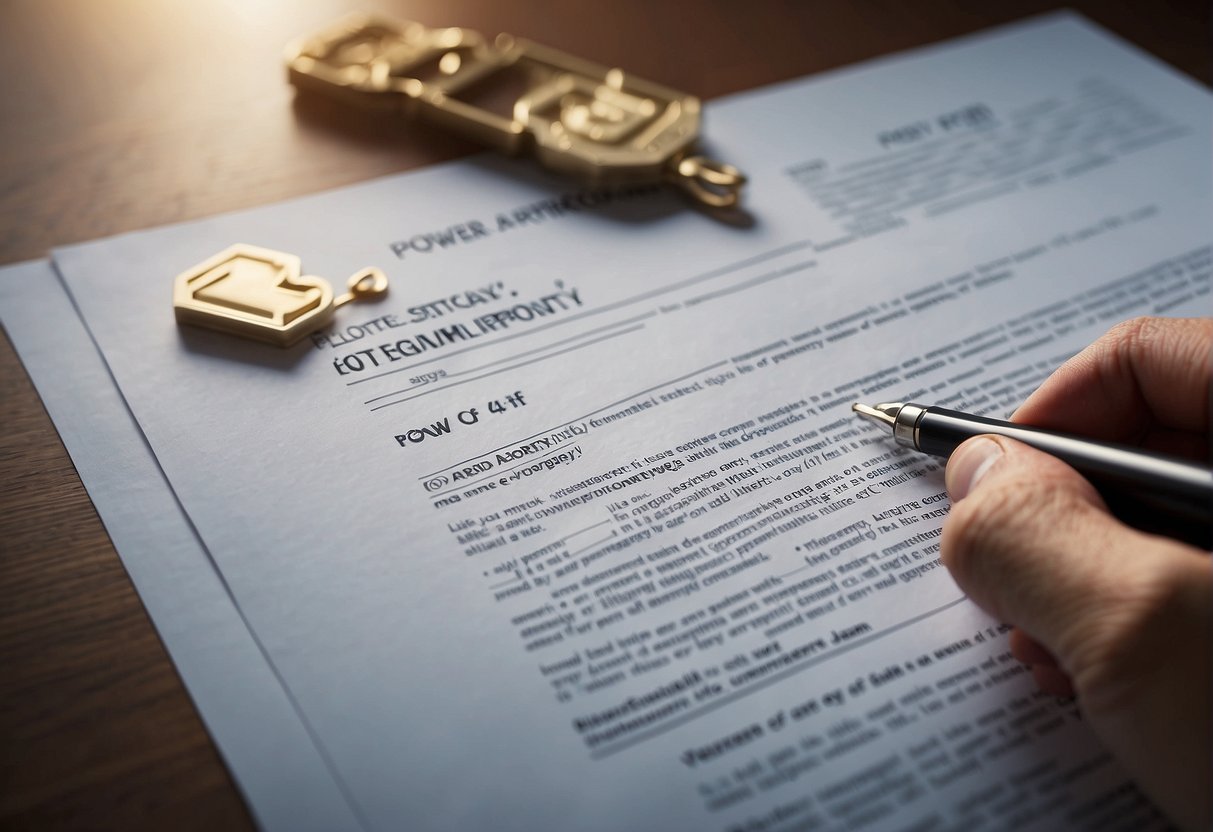In the realm of real estate, ‘POA’ stands for Power of Attorney, a legal document that grants one person or entity the authority to act on behalf of another in property transactions. This authoritative power can vary in scope, allowing the nominated agent to handle various aspects of the principal’s affairs within the real estate sector. It’s a vital tool that can be used in situations where an individual cannot be present themselves or is incapable of managing their property-related matters.

The effectiveness of a Power of Attorney can significantly impact real estate ownership and management. It allows for continuous management of properties during the owner’s absence, incapacity, or when specific expertise is required. When selecting a POA agent, it is crucial to choose someone trustworthy and competent, as they would have substantial control and decision-making power over one’s property. Financial implications are also paramount since a POA can affect the profitability and legal standing of real estate endeavors.
Key Takeaways
- A Power of Attorney in real estate designates an agent to manage property affairs.
- The scope of a POA ranges from narrow to broad, influencing how property is handled.
- Trust and competency are critical when choosing a POA agent due to their significant authority.
Understanding POA in Real Estate
In real estate, a Power of Attorney (POA) can play a pivotal role in facilitating property transactions when the principal cannot be present. The document grants an agent the authority to act on behalf of the principal, ensuring property management, sales, and purchases can proceed in the principal’s best interests.
Definition and Types of POA
Power of Attorney (POA) is a legal document that gives an agent the authority to act on behalf of the principal in managing assets and conducting transactions. In real estate, this could involve managing, selling, or purchasing property. There are several types of POA, each varying in scope and duration:
- Durable Power of Attorney: This type of POA remains effective even if the principal becomes incapacitated. It ensures continuous authority in property affairs without interruption.
- Non-Durable Power of Attorney: This type terminates if the principal becomes incapacitated or passes away. It is typically used for specific transactions with a limited timeframe.
- General Power of Attorney: Offers broad powers to the agent to manage all the principal’s affairs, including real estate assets.
- Limited Power of Attorney: Also known as a special or specific POA, this type grants the agent authority only for a specified activity, like closing the sale of a home.
Role of POA in Property Transactions
A POA becomes instrumental in real estate transactions, especially when the principal cannot be physically present due to various reasons such as being overseas or incapacitated. The agent acts in the principal’s best interests, having the power to sign legal documents, enter contracts, and handle sales or purchases. For instance, a durable POA ensures that an agent continues to manage property effectively if the principal is no longer able to make decisions.
Choosing the Right Type of POA
Selecting the correct type of POA involves assessing the principal’s needs and the extent of authority they wish to grant. For short-term, specific transactions, a limited or non-durable POA may suffice. Conversely, when looking for long-term property management or when future capacity might be a concern, a durable power is often the most secure and appropriate choice. Principals must trust their chosen agents to act responsibly and in their best interests, as the decisions made by the agent can significantly impact the principal’s assets.
Legal Aspects of POA

Understanding the legal frameworks surrounding a Power of Attorney (POA) is crucial for its valid operation in real estate transactions. The creation, witness requirements, and the potential for amendment or revocation are governed by specific laws and regulations.
Creating a POA: A Step-by-Step Guide
A POA must be created according to legal standards to be considered valid. The principal—the person granting the power—chooses a trusted agent to act on their behalf. The documentation must clearly state the scope of the agent’s authority, which can range from general management to specific tasks. Step-by-step, this typically involves:
- Selecting an agent based on trust and capability.
- Drafting the POA document, ideally with legal assistance to ensure accuracy.
- Clearly defining the limitations and powers assigned to the agent.
Legal language must be precise to avoid errors that could lead to legal implications, such as disputes or unenforceable provisions.
The Role of Witnesses and Notarization
For a POA to be legally binding, it generally must be witnessed and notarized. This process varies by jurisdiction, but commonly involves:
- Having at least two disinterested witnesses observe the signing of the POA.
- A notary public verifies the identities of the signatories and ensures the principal understands the document’s significance.
This notarization acts as a deterrent against fraud and confirms the document’s legitimacy, helping to protect the interests of all parties involved.
Revocation and Amendment of POA
The principal retains the right to revoke or amend the POA. For revocation or changes to take legal effect, they must be executed with the same formalities as the original POA, often requiring:
- A written declaration detailing the revocation or amendments.
- Notarization of the new document to validate the changes.
- Informing any successor agents and third parties who may be affected by the POA.
These steps ensure that the POA reflects the current wishes of the principal and that previous versions are no longer applicable, thereby mitigating potential legal implications.
The Practical Use of POA in Real Estate

Power of Attorney (POA) in real estate encompasses authorizing an agent to manage various aspects of property on behalf of the principal. This includes transactions, property management, and sometimes specific tasks associated with a property sale. The POA provides significant advantages but also imposes certain restrictions on the principal.
Agent’s Authority in Property Management
Under a POA, an agent may be granted extensive control over a principal’s real estate assets, ranging from daily maintenance to overseeing business obligations. Specifically, the agent can engage in:
- Handling transactions: The agent is empowered to buy, sell, or lease property.
- Maintenance and repairs: Overseeing property upkeep and coordinating any necessary repairs.
- HOA interactions: Managing all matters related to homeowners’ associations, such as compliance with rules and regulations.
- Financial management: The agent might also handle rent collection and payment of expenses connected to the property.
These responsibilities can be tailored to fit the needs of the principal, ensuring the property is managed efficiently in their absence.
Benefits and Limitations for the Principal
While there are several benefits to granting a POA, principals should be mindful of its potential limitations.
Benefits:
- Convenience: Principals who are unable or unwilling to manage their property can ensure it is still taken care of.
- Flexibility: The POA can be customized, whether for a single transaction or ongoing property management.
- Continuity: In the event of the principal’s incapacity, the agent can continue managing the property without interruption.
Limitations:
- Liabilities: The principal is ultimately responsible for the agent’s actions, which could lead to potential liabilities.
- Loss of control: The principal surrenders a degree of personal control over their property.
- Trust: The principal must have absolute trust in the agent to act in their best interests.
By understanding these benefits and limitations, principals can make informed decisions about using a POA in their real estate endeavors.
Financial Implications of POA
Power of Attorney (POA) in real estate significantly impacts the management of financial affairs and the execution of real estate transactions. It allows the designated agent to handle various financial responsibilities and costs on behalf of the principal.
Managing Financial Affairs with POA
When an individual grants a Power of Attorney to an agent, the agent gains the authority to manage the principal’s financial affairs. This may include access to bank accounts, handling maintenance fees and HOA fees, and ensuring that all financial obligations are met in a timely manner. The agent must act in the principal’s best interest, managing expenses, and optimizing financial resources.
Real Estate Transactions and Closing Costs
In real estate transactions, an agent with POA can negotiate with real estate agents, mortgage lenders, and other parties involved in the transaction. They handle closing costs, which can include appraisal fees, title searches, and loan origination fees. A thorough understanding of these fees is vital, as they can affect the overall financial outcome of the transaction. It is also possible that POA fees could be incurred for the agent’s services, depending on the agreement between the principal and the agent.
Selecting a POA Agent
When assigning a Power of Attorney (POA) in real estate, the choice of agent is a critical decision that affects financial and legal affairs. The agent’s role is to act in the principal’s best interests, making trustworthiness and reliability paramount.
Criteria for Choosing an Agent
Selecting an agent requires careful consideration of several factors to ensure they will act responsibly and ethically. Key criteria include:
- Trustworthiness: They must be highly trustworthy, as they will handle significant aspects of the principal’s real estate affairs.
- Availability: The agent should be readily available to manage the responsibilities that come with holding a POA.
- Familiarity with Real Estate: Knowledge of real estate transactions is beneficial.
- Best Interests: They must be committed to acting in the best interests of the principal at all times.
- Professional Advice: Consultation with a legal professional or an estate planning expert may be advisable to identify the most suitable candidate.
Responsibilities of an Agent
An agent granted POA assumes substantial duties. They are entrusted with:
- Authority to Act: Full authority to manage the principal’s real estate transactions as stipulated by the type of POA granted.
- Financial Probity: Managing affairs with integrity to avoid conflicts of interest.
- Transparent Decision-Making: Making decisions that are well-documented and transparent, reflecting the principal’s wishes and best interests.
- Legal Compliance: They must comply with all relevant laws and regulations while executing the POA.
The ideal agent is a trustworthy individual who understands the gravity of the role and is committed to looking after the principal’s property-related matters with diligence and care.
Impact of POA on Real Estate Ownership
When discussing POA in real estate, it is crucial to consider its effect on property management and the intricacies of different association types that govern certain real estate environments.
Influence on Property Value and Maintenance
Power of Attorney (POA) in real estate primarily refers to a legal document that grants an individual the authority to make decisions concerning the property of another person, which can include selling, managing, or leasing the property. This delegation of authority can significantly impact the resale value of a property, depending on how well the appointed agent maintains and manages the property. Proper maintenance and strategic property management under a capable agent can potentially increase a property’s market value, while poor maintenance may lead to depreciation.
- Resale value: Enhanced by diligent oversight and maintenance.
- Maintenance: Guided by the authority given to the agent, influencing property conditions and value.
HOA, COA, and POA: Understanding the Differences
Homeowners Associations (HOAs), Condominium Owners Associations (COAs), and Powers of Attorney (POAs) in real estate serve different functions, though they all relate to property management and community regulations.
- HOAs typically govern single-family home communities, managing common areas and setting rules for residents.
- Common areas: Maintenance is overseen by the HOA, impacting collective property value.
- Regulations: HOA rules can affect individual property rights and community lifestyle.
- COAs manage the shared parts of condominium complexes, handling similar tasks as HOAs but specific to condo living.
- Maintenance: COAs are responsible for the upkeep of building exteriors and common facilities.
- Community: They create a sense of community, ensuring the environment is kept to a certain standard.
POAs in real estate, on the other hand, pertain to individual decision-making authority rather than collective management. A POA can be relevant in both HOA and COA settings when a property owner needs a representative to manage their real property within the regulations of these associations. The impact of a POA is personalized, affecting the owner’s individual assets rather than the broader community.
Community and Neighborhood Considerations
In the realm of real estate, particularly within the context of a Property Owners’ Association (POA), community and neighborhood considerations play a pivotal role. These elements shape the living experience and impact long-term satisfaction for residents.
Amenities, Zoning, and Regulations
Amenities are central to community appeal, often including parks, playgrounds, and swimming pools. They enhance the quality of life by providing recreational spaces and contribute to the overall desirability of the neighborhood.
- Parks: Accessible green spaces for leisure and gatherings.
- Playgrounds: Safe play areas for children, promoting a family-friendly environment.
- Swimming Pools: Community pools that offer relaxation and exercise opportunities.
Zoning dictates land use within the community, ensuring compatibility and preserving the character of the neighborhood. It’s enforced to maintain a balance between residential privacy and accessibility to commercial services.
Regulations set by a POA ensure compliance with agreed-upon aesthetic and structural standards, impacting factors such as decor and home modifications. These rules are vital for maintaining property values and reducing liability risks associated with property ownership.
Board Members and Community Involvement
POAs are governed by board members, who are often residents of the community themselves. Their role involves:
- Enforcing community regulations.
- Overseeing the maintenance and enhancement of communal areas.
- Managing budgets and setting POA fees to cover necessary expenses.
Active community involvement is encouraged, as it fosters a sense of belonging and mutual care amongst neighbors. This participation may range from attending meetings to volunteering for community improvement projects. A well-engaged community supports a collaborative approach to neighborhood governance, which can directly influence the quality of life for its residents.
Frequently Asked Questions
In this section, we address common inquiries concerning Power of Attorney (POA) in real estate. These questions cover various aspects of POA, including its definition, effects on property sales, fee structures, importance in rental management, implications for community governance, and interpretation in property listings.
What is the definition of POA in the context of property transactions?
POA in real estate refers to a legal document that grants an individual the authority to act on behalf of the property owner in legal affairs. This can include the buying, selling, managing, or leasing of property.
How does POA influence the sale process of a property?
A POA can significantly streamline the sale process of a property by allowing the designated agent to sign documents and make decisions without the need for the owner to be present. This can be particularly useful if the owner is unavailable or incapacitated.
What are POA fees and what do they cover in real estate?
POA fees, in the context of a homeowners association (HOA), relate to costs associated with the maintenance and management of common areas and shared amenities in a community. They can cover services like landscaping, security, and community facility upkeep.
Can you explain the role of POA when dealing with rental properties?
A POA in rental property matters empowers an agent to manage day-to-day operations on behalf of the owner, such as tenant screenings, lease negotiations, rent collection, and maintenance issues.
In what ways does POA affect neighborhood governance or community management?
In terms of neighborhood governance, a POA can allow an agent to make decisions in place of property owners for matters that concern the community or the homeowners association, including voting on community issues and payment of communal fees.
What are the implications of ‘price upon request’ listings in the housing market?
Listings marked as ‘price upon request’ have their pricing information withheld and disclosed only to serious potential buyers. In POA contexts, an agent operating under POA may exercise discretion when revealing price information to ensure that only qualified buyers express interest.

